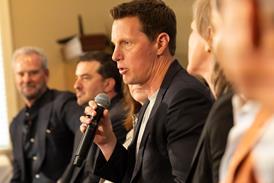When it kicks off on November 1 with the North American premiere of Robert Redford's Lions For Lambs, AFI Fest will celebrate its 21st year as an American Film Institute event. But coming of age has not meant an end to growth, suggests festival director Christian Gaines.
In recent years, he says, the Los Angeles event - the only US festival accredited by the International Federation of Film Producers Associations (Fiapf) - 'has changed and grown considerably. We've made an effort to zoom in on places where we think we have something to contribute to the festival world.' Areas of focus have included the event's positioning at the start of the awards season and its role as 'a festival of discovery. We show lots of films by first or second-time film-makers that are US or world premieres,' Gaines says.
Audiences seem to have responded: consumer attendance increased 30% between 2002 and 2006. And since 2004, the event's industry reputation has been bolstered by a strategic partnership with the American Film Market (AFM), which runs almost concurrently in neighbouring Santa Monica.
Foot in both camps
This year's programme reflects AFI Fest's dual role as an audience and industry event.
Directed by and starring Redford, alongside Meryl Streep and Tom Cruise, Lions For Lambs is the first production from the new United Artists, a partnership between Cruise, Paula Wagner and MGM.
The festival's other gala presentations are Jason Reitman's Juno, about a woman who considers giving up her unborn child for adoption, and on closing night, Mike Newell's period drama Love In The Time Of Cholera, another North American premiere.
Festival tributes will spotlight Catherine Deneuve, whose voice features in the festival special presentation Persepolis, and Laura Linney, star of The Savages, another special presentation.
The full line-up comprises 97 features and 51 shorts (from 37 different countries) divided into sections including the International Feature Competition (for projects from first and second-time film-makers), the International Documentary Competition and the World Cinema showcase.
Seven of the films will have their world premieres, 17 of them their North American premieres, and 18 their US premieres.
A number of non-US films in the line-up - including 4 Months, 3 Weeks & 2 Days (Romania), The Counterfeiters (Austria) and Persepolis (France) - have just been submitted for the foreign-language film Oscar and should be given a valuable profile boost from their festival screenings.
The line-up was assembled, says new AFI Fest artistic director Rose Kuo, 'from the perspective of an audience member who wants to see what's going on in world cinema.'
Rather than chasing premieres (last year's festival had 22 world, 30 North American and 28 US premieres), 'we were about quality films this year,' Kuo explains.
Beyond its film line-up, AFI Fest also stages events and screenings including a free public showing of Alfred Hitchcock's Psycho on Halloween night; AFI Digifest; and the Kodak Connect Program, which offers festival film-makers the opportunity to network with industry professionals.
The festival's most significant industry aspect, however, is its partnership, now entering a fourth year, with the AFM, the bustling 28-year-old film market run by the Independent Film & Television Alliance.
The partnership allows AFI Fest to boast that in 2006 it produced more North American sales of international titles and international territory sales than any other US festival. This year, at least 30 AFI Fest titles will also be represented at the AFM (last year the number was 56).
The partnership, though, has yet to prove as symbiotic as the long-established pairings of festivals and markets in Cannes and Berlin.
Gaines concedes there is still scepticism among some AFM regulars, but asserts that 'we win people over one company, one sales agent at a time, and we are definitely making progress as far as that goes'. And he acknowledges the geographical divide between the events - the market's beachfront location is 10 traffic-clogged miles from the festival's headquarters at Hollywood's ArcLight Cinemas - is 'not an ideal situation'.
Yet the alliance, he says, offers real benefits to film-makers, who can gain valuable insight into how the industry works, and to sales companies. 'There are all kinds of press and publicity opportunities that sales agents can make the most of,' Gaines asserts. 'And it gives them the opportunity to introduce a film to buyers in a cultural, community environment, rather than just in a market screening.'
US distributors say AFI Fest rarely offers acquisition possibilities that have not been seen at earlier festivals. But they see real value in an autumn festival that can present already acquired films to Los Angeles audiences and critics, as well as to the city's concentration of awards voters.
Last year, Sony Pictures Classics had Curse Of The Golden Flower and Volver at AFI Fest, and this year it has The Band's Visit, Persepolis and The Counterfeiters in the festival line-up.
AFI Fest 'helps word-of-mouth on excellent movies', says company co-president Michael Barker. 'What makes it different is that it's in Los Angeles. And fall is an important time for movies that need some awards consideration.'
The festival also functions as a venue in which films can be presented in their best light, to audiences or to buyers, says Arianna Bocco, vice-president of acquisitions and productions at IFC Entertainment, whose acquisition Drama/Mex was in last year's line-up.
'A lot of the films that screen at AFI Fest have market screenings at the AFM and the market screenings are not ideal situations in which to screen your film,' Bocco suggests. 'They're often half full and there are people walking in and out. To have a screening in front of a real audience gives you a better sense of the film and how it plays.'


















No comments yet